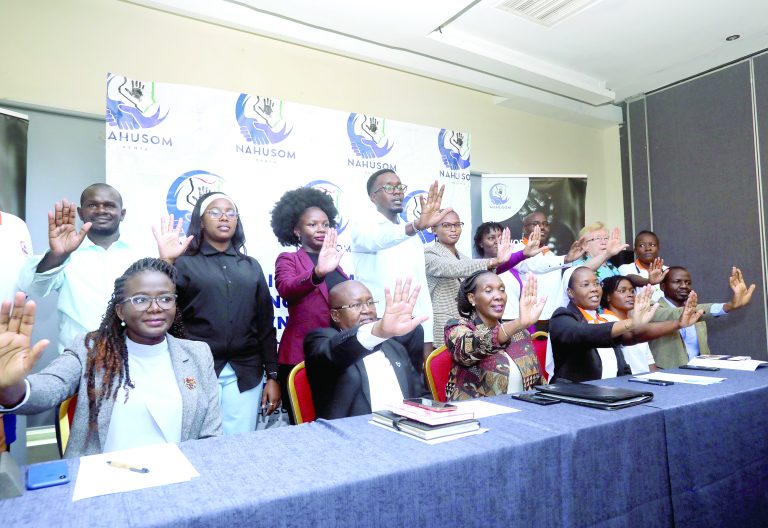NGOs raise alarm as Kenyans return home without dignity

Civil Society Organisations on April 16, 2025, raised a red flag on Kenyans returning home after years of failed search for greener pastures abroad as most of them end up in slavery and other illicit activities, calling for targeted support.
Confessions by some of the returnees show a lot that end up in cyber scamming, and forced commercial sex work, which includes illegal activities, further exposing this population to various challenges including mental disorders.
Now the organisations handling this set of persons are saying the returnees especially those who go to the Middle East and other parts of the Asian continent urgently need support as a huge number come back home empty-handed, but loaded with skills that can be counter-productive.
Lawyer Lilian Nyangasi who is also Programmes Director at the Set Free to Thrive organisation says most of those returnees come back to hostile environments, notably, rejection by their relatives sending them to the streets.
“I think there’s a lot of rehabilitation that will be required,” she told journalists during a meeting on trafficking for forced criminality in Kenya.
Criminal training
Because these people did not voluntarily sign up for those criminal training or practises according to the lawyer, the government is therefore supposed to put in place a very robust rehabilitation process, treat this as any ordinary disease because of trafficking, and avoid victimising them.
While she explained this, Nyangasi noted that indeed the returnees have those criminal skills but then it’s important to find ways of helping to reintegrate them, for rehabilitation rather than condemnation, or treatment as suspects or outcasts in society.
“There is a small light at the end of the tunnel as most of them are being protected in shelters because it’s a priority that their physical well-being and mental well-being be taken care of even before they are integrated with their families,” she said.
So the first call of action, the lawyer advised, is for them not to feel under pressure to go back to their homes when they arrive in Nairobi.
Teaching job
For instance, John, not his real name, is one of those Kenyans who returned home recently from Myanmar, and his family in western Kenya did not want anything to do with him. Back in 2023, he was prompted to apply for a teaching job that was advertised online in the Southeastern Asian country.
However, unknown to John he was being conned. He was forced into online crime after a short training programme. His relatives in Western Kenya had to sell a piece of land, which was meant to be his ancestral inheritance with high hopes he would make money and buy his own, but things didn’t go the way they initially appeared to be.
“We may seem fine but we are actually very sick,” he said, explaining that most of those who found themselves in this strange situation were beaten and tortured, physically and mentally.
James Kariuki, the Kenyan jailed in Dubai over Sh81 million scam, says fraudsters stole his identity. He narrated that in May 2020, during the Covid-19 pandemic as reported by the local media, while in Dubai and searching for another job, he met a would-be employer, only to lose his identity to the man he trusted to make his life better.
The Network Against Human Trafficking and Smuggling of Migrants (NAHUSOM-Kenya) has reported that so far this year the country has recorded 800 human trafficking survivors who have returned from other countries.
However, according to Edith Murogo, Founder and Executive Director of the Centre for Domestic Training and Development (CDTD), as it stands right now the available data is segregated.
She said the newest trend when it comes to human trafficking is no longer physical, and through family members to end up in another country. “But now they’re using the internet to traffic these young people because the youth are so much into social media and media at large,” Murogo, also the Goodwill Ambassador for the NAHUSOM Network.
What’s happening to the returnees, people who have suffered, gone through so much physically and mentally, she said, is not good. She said they need to show up at the airport with more support.
“Such returnees should be afforded holistic support in terms of psychosocial support, and we need to make sure that they can have quality counselling,” she added. Murogo pointed out that such people also need to access shelter, healing, and job opportunities as most of them end up in jails. “We also need to ensure that they are not victimised,” she added.
NAHUSOM is a national umbrella network of civil society organizations, faith-based entities, community-based groups, academia, trade unions, private sector actors, and other social movements.
Mutuku Nguli the Chief Executive Officer for Counter-Human Trafficking Trust East Africa, (CHTEA), a member of NAHUSOM said it’s urgent that funds are allocated for the rehabilitation of the returnees, depending on each individual’s needs. He explained this is because there is a risk of the returnees going back to their families.
“There is a risk of whether they are accepted by their families, and whether they are going to be traumatised by their relatives because they are expected to bring back something, and whether they will be accepted or not,” he said.
According to Nguli, NAHUSOM is reaching out to those who feel they are not accepted by their families, and believe that they are being pushed away, which is also another risk, where now there is an account of even more criminals out in the space.
The Ministry of Foreign and Diaspora Affairs has recently confirmed that Kenyans and other foreign nationals were held in fraud centres located in areas controlled by rebel groups fighting the Myanmar government, making rescue operations extremely difficult.










